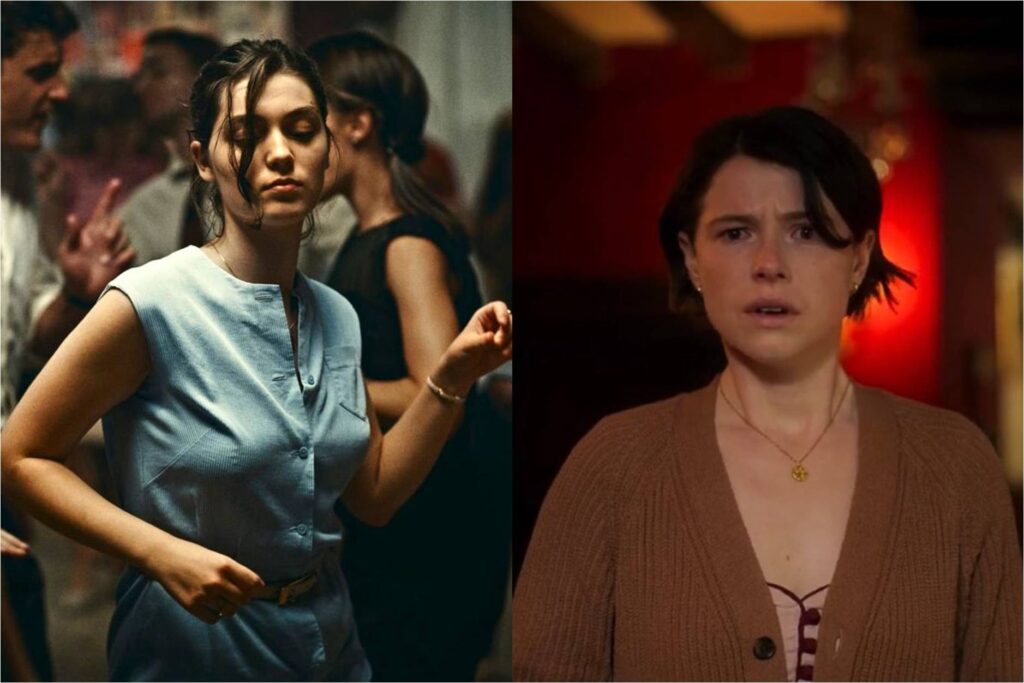
The internet is fond of sarcastically asking if men are OK, but the same question might be more seriously asked of women. Pay equity, reproductive freedom, toxic masculinity, #MeToo—modern society is aswirl with issues surrounding female safety and autonomy. So it’s no surprise that cinema, with its quicksilver capacity to reflect on and respond to cultural shifts, is tackling these concepts with variety and alacrity. It is a bit surprising, however, for the same month to produce two theatrical releases which wrestle with men’s aggression and women’s liberation so directly, even if they do so in dramatically different ways.
Alex Garland’s third feature, the coyly titled Men, is the more ambitious work, at least in terms of scope and style. Garland favors small casts and isolated locations, but his films (Ex Machina, Annihilation) possess an aesthetic grandeur, teeming with bold colors and striking images. (His television series, the frustrating but beguiling Devs, is one of the most visually enthralling things you can find on the small screen.) This isn’t merely a matter of showing his audience pretty pictures but of somehow splicing beauty with deformity. Garland is a painterly artist with the emotional sensibility of a sick fuck.
In the most ravishing sequence in Men, a woman named Harper (Jessie Buckley) takes a leisurely stroll in the woods, which the cinematographer Rob Hardy captures as though he’s shooting an appreciative travelogue, his camera lingering on bright green grass and perky violet-blue flowers. Eventually Harper arrives at a railroad tunnel, whose yawning black mouth suggests the ominous unknown, but which she approaches eagerly; as she enters the abyss, she begins singing a series of “Ah!” tones, basking in delight as their cascading echoes bounce off the mossy walls and create a symphonic harmony. But then, another noise enters the mix and distorts the tune into a jarring buzz; squinting, Harper spots an emerging figure at the tunnel’s far end, an unknown creature that begins making its way steadily toward her. And with that, in a flash, Garland has warped natural splendor into unnatural terror.
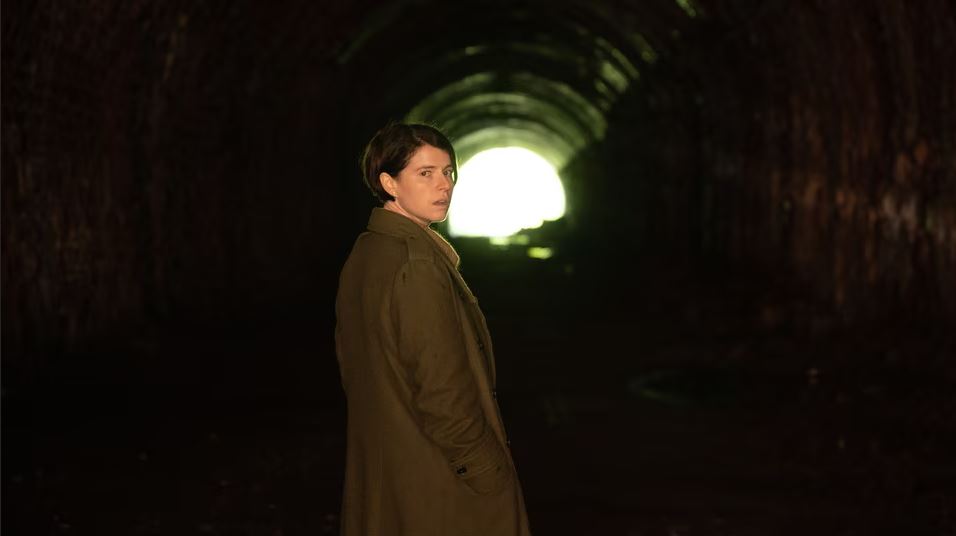
Harper has ample reason to be distressed. She’s vacationing in a remote village following the death of her husband (Paapa Essiedu), whose suicide we glimpse during a chilling early flashback. Her new landlord, Geoffrey, seems cheerful enough (“He’s very country,” she tells a friend via phone), but she soon finds herself being stalked by a naked brute who shows up in her apple orchard. (Garland choreographs this eerily quiet episode, in which we see the intruder well before Harper does, with masterful patience.) Later, a masked teenager taunts her, a police captain dismisses her fears as frivolous, and a vicar’s sympathy curdles into condemnation. Now, ask yourself: What gender do these menacing individuals all share? Do you remember this movie’s title?
All of these chaps, by the way, are played by the gifted English actor Rory Kinnear, thanks to an array of greasy wigs, facial prosthetics, and unnerving special effects. The presumed point of this, beyond allowing Kinnear to flaunt his agility, is to gesture toward the universality of male evil, which can take various forms—indifference, mockery, impugnation, savagery—but which always carries the same purpose of suppression. The men whom Harper meets alternatively try to admonish her, threaten her, diminish her, or kill her, but above all they want to own her—to make her subordinate to their own selfish desires.
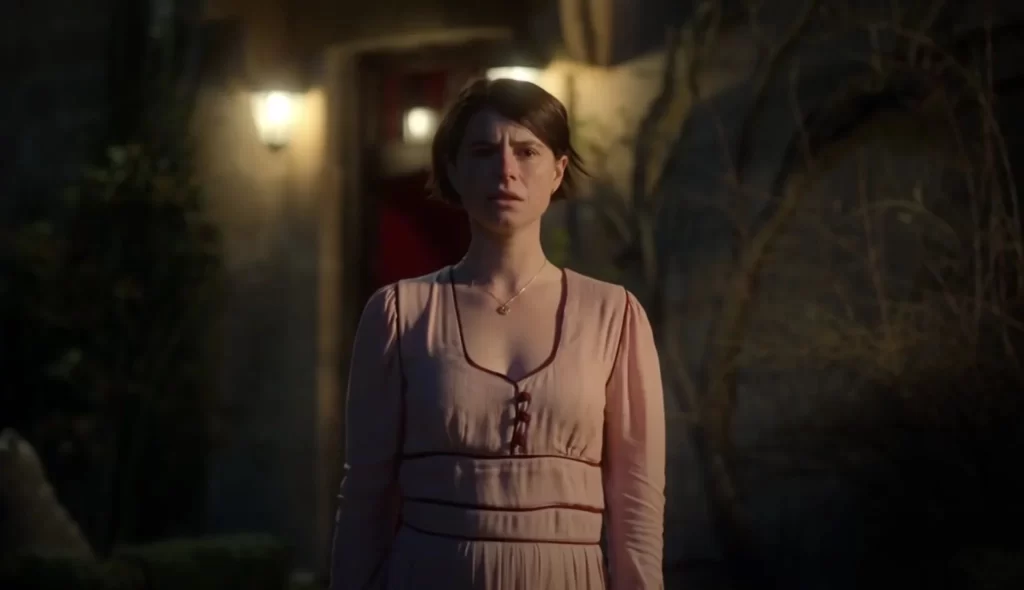
The irony of Men is that as it progresses—shifting from a mournful study of grief into a psychological thriller streaked with bits of madness—it turns Harper into the very object it purports to be denouncing: a passive woman in a male-dominated world. A skilled performer, Buckley credibly registers fear and dismay, but her character spends much of the film in a posture of retreat—warily backing away from rattling doors, fleeing from ravenous pursuers—and in chronicling her misery, Garland robs her of her agency. I’m not suggesting that movies should never depict women in torment, but Garland is so in thrall of his own vision that he transforms Harper from a fully realized person into a generic victim.
This doesn’t (ahem) neuter the picture of its sensory pleasures, which remain stylish and provocative. Garland cleverly (if grotesquely) concocts a horrific recurring wound in which a hand is cleaved down the middle to its forearm, only to become a fleshy, two-pronged strangulation device. And in its final stretch, the film delivers an indescribable sequence that blends birth and death with ghastly ingenuity. Yet while that scene is arresting and exotic, it isn’t especially meaningful. Visually speaking, this movie is an undeniable achievement. But when it comes to connecting its grisly grandeur to a coherent theme, Men is barely OK.

Compared to Harper’s supernaturally tinged horrors, the challenges faced by Anne, the heroine of Audrey Diwan’s Happening, would seem to be less troubling. She isn’t beset by shapeshifting monsters. The men she meets are judgmental and ineffectual rather than vituperative and murderous. Nobody tries to attack her or terrorize her or break into her house. No, Anne’s problem is far more prosaic: She’s pregnant.
And the point of Happening, which takes place in 1960s France and which Diwan and Marcia Romano adapted from Annie Ernaux’s autobiographical novel, is that the fact of Anne’s pregnancy is very much a problem. She wants an abortion, and she can’t get one. From this simple conflict, Diwan spins an urgent and often terrifying thriller, a gripping horror movie with no ghosts or ghouls but which conjures monsters all the same.
The abortion picture has experienced a mini-boom of late (recent entries include Unpregnant, Plan B, and Never Rarely Sometimes Always), to the point where its narrative arc—in which a woman must overcome governmental obstacles in order to exercise control over her own body—has become rather familiar; the differences tend to lie in detail and tone. With Happening, Diwan’s approach is narrow, both visually—she shoots in a boxy aspect ratio that claustrophobically tightens the frame around her characters, whom she often observes with an unfussy handheld camera—and conceptually. It’s foolish to pretend that this isn’t a political film, but it is also fiercely focused on Anne’s personal struggle, insistently treating her as an individual rather than a symbol.
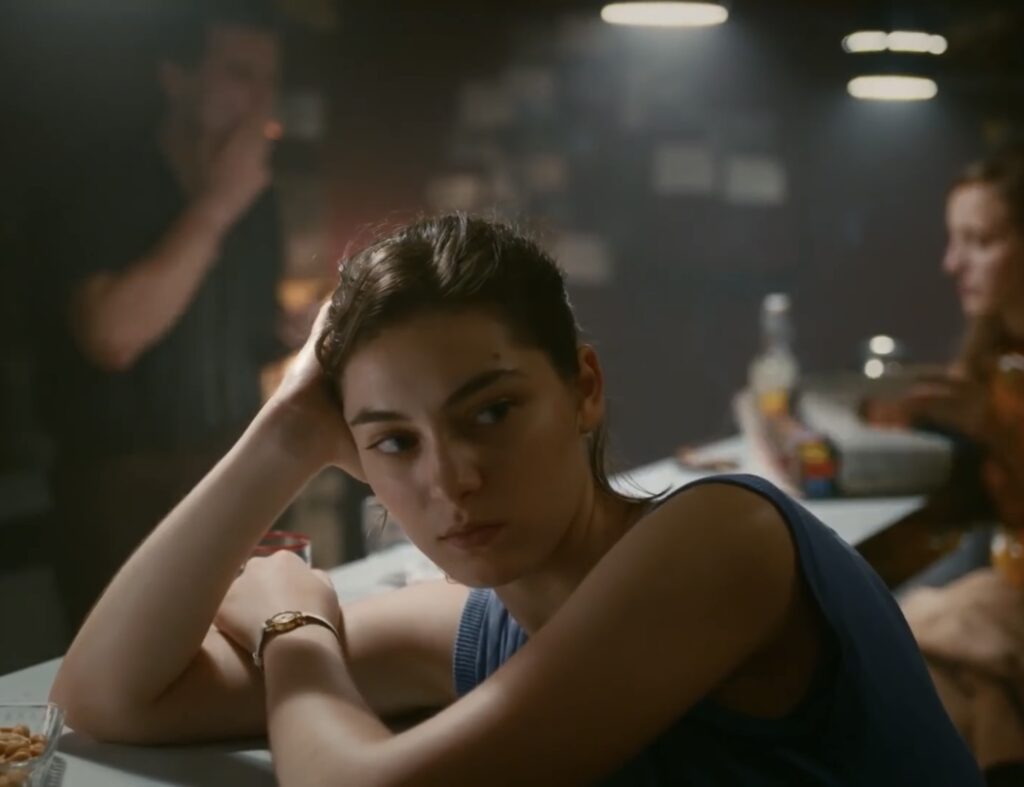
Played with blazing intensity and hypnotic rigor by Anamaria Vartolomei, Anne is a more prickly protagonist than you might expect. An ace student at a prep school (raise your hand if you’ve never heard of the rhetorical device called “anaphora”), she carries herself with a brash confidence that is the envy of her friends and the cause of a bitter rivalry with other (blurrily developed) classmates. Boys are naturally attracted to her but also seem wary of her assertiveness. She is brilliant, vivacious, and maybe a little mean. Yet when a doctor places his hand on her abdomen and informs her of her current medical condition, her arrogance is replaced by anguish. (To emphasize the ticking-clock nature of Anne’s dilemma, Diwan routinely cuts to black for stark title cards that simply read “9 weeks” and the like.)
One of the smartest screenwriting choices of Happening is that Anne never doubts her desire, her need, to obtain an abortion. (At one point she admits that she wants to have kids someday—just not at the expense of living her own life.) This isn’t the story of a conflicted woman wrestling with shame or grappling with her conscience. It’s about a determined woman whose extraordinary resolve collides against a powerful system engineered to deprive her of her will. To contrast it with Men: Where Harper reacts, Anne acts.
As her quest for healthcare becomes increasingly dire—as the weeks start to climb and her grades start to slip—it becomes clear that Anne is on her own. The first doctor she meets is mildly sympathetic, but as he explains—informing her, a bit too didactically, of France’s criminal attitude toward abortion—his hands are tied. When she pleads with another doctor for help terminating her pregnancy, he prescribes her medication that yields the opposite effect. The young man whom she slept with seems like a nice enough guy, which means he’s completely useless. Her friends are intrigued by the notion of sex—in one striking scene, a self-described “worldly virgin” straddles a pillow and vigorously simulates coitus—but when confronted with the aftermath of Anne’s dalliance, they respond with revulsion.
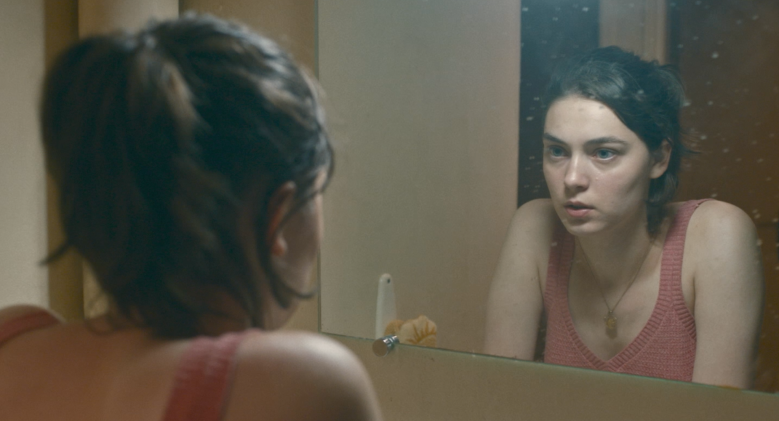
It is tempting to chastise these people—to call out their cowardice, to berate them for their complicity—but as Diwan’s crisp storytelling makes plain, their actions are entirely understandable. (“Do you want to go to prison too?” one of Anne’s friends asks another.) The men in Anne’s orbit may be feckless, but there are no individual villains in Happening. Instead, it is the legal system—the bureaucratically sanctioned process of legislative subjugation—that silently oppresses her.
The costs of that oppression, unflinchingly illustrated by Diwan and Vartolomei, are staggeringly brutal and all too real. Men may operate as a phantasmagorical nightmare, but Happening is the far scarier movie, registering Anne’s escalating panic with pitiless (if compassionate) honesty. In a trio of riveting sequences—which Diwan shoots in long takes, her camera largely trained on her young star’s expressive face—it contemplates the drastic measures that anti-abortion laws have forced Anne to take. Simple household objects—a long metal file, a rubber wand, a pair of scissors—become instruments of agony, as it’s unclear whether Anne is propelling herself toward salvation or calamity.
It’s almost alarming, how a movie as thoughtful and unadorned can become so achingly suspenseful, and how it can present the risks to its characters—thwarted potential, imprisonment, death—with such clarity. Alarm, of course, is part of the point, and not just in 1963; Happening may be a French film whose script was written several years ago, but it’s impossible to watch it and not think of the leaked draft opinion in which the U.S. Supreme Court appears poised to eviscerate the constitutional right to abortion that American women have held for the past half-century. It’s a period piece where the period portrayed might be the future as well as the past.
Still, to perceive this vibrant, forceful movie as a single-issue polemic does it a disservice. It’s bigger than that, considering one woman’s audacious journey across a patriarchal minefield. Men may creepily depict the cruelty of particular members of the species. But as Happening all too persuasively demonstrates, the most dangerous threat to women isn’t men; it’s the man.
Men grade: B-
Happening grade: A-
Jeremy Beck is the editor-in-chief of MovieManifesto. He watches more movies and television than he probably should.
